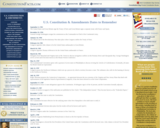
A list of important dates and events related to the United States Constitution
- Subject:
- History
- Social Science
- Social Studies
- Material Type:
- Reading
- Provider:
- ConstitutionFacts.com
- Date Added:
- 01/03/2023

A list of important dates and events related to the United States Constitution

Article I, Section 10 of the United States Constitution plays a key role in the American system of federalism by limiting the powers of the states. Under the Article, the states are forbidden from entering into treaties with foreign nations; instead reserving that power to the President of the United States, with the approval of two-thirds of the U.S. Senate. In addition, the states are forbidden from printing or coining their own money and from granting titles of nobility.

Article I, Section 8 of the U.S. Constitution specifies the “expressed” or “enumerated” powers of Congress. These specific powers form the basis of the American system of “federalism,” the division and sharing of powers between the central government and the state governments.
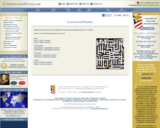
Download a number of crossword puzzles about the United States Constitution.
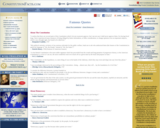
Read through a list of famous quotes about the United States Constitution.
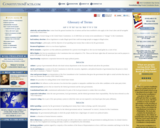
Find definitions for key terms used in the fouding documents of the United States of America
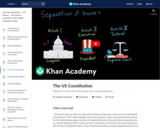
Many engaging lessons and instructional clips on the U.S> Constitution. Can save materials in teachers' account.
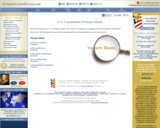
Test your knowledge of the U.S. Constitution, Supreme Court, Articles of Confederation, Founding Fathers and Declaration of Independence. Choose from five Treasure Hunts to print out and then search constitutionfacts.com to find the answers.

Jack Rakove, William Robertson Coe Professor of History and American Studies at Stanford University, briefly discusses James Madison's role in the framing and ratification of the Constitution, as well as the legal approach of Originalism.
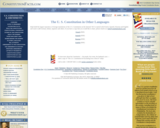
Help build the largest repository of foreign translations of the U.S. Constitution on the Internet! We’ve started with French, Spanish, Russian and English. Download pdf files of the Constitution in these languages.

US Department of the Treasury website.

This season, the US: Past, Present, Future team has been discussing how we learn about American history. In this program, we will take a hard look at how we teach and talk about the American Revolution and our nation's founding.
This lesson is designed to be a compare-and-contrast reading activity using the Utah and U.S. Constitutions.

In United States v. O’Brien (1968), Chief Justice Earl Warren laid out a test for deciding whether the government has unconstitutionally restricted symbolic speech. In general, the First Amendment of the U.S. Constitution protects a person’s right to speak freely. However, the 7-1 majority decision in O'Brien found that there are some instances in which the government can regulate free speech, like burning a draft card during wartime.

United States v. Wong Kim Ark, decided by the U.S. Supreme Court on March 28, 1898, confirmed that under the Citizenship Clause of Fourteenth Amendment, the United States government cannot deny full U.S. citizenship to any person born within the United States. The landmark decision established the doctrine of “birthright citizenship,” a key issue in the debate over illegal immigration in the United States.
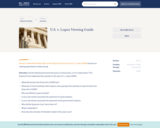
After teaching federalism, as a formative assessment, have students read through through the opinion of the Supreme Court Case Lopez v. United States . Students should be able to explain how federalism is applied in this case and be able to identify the advantages and disadvantages of federalism citing examples from the case.

What Is Taxed and Why? This IRS Text/HTML has several lesson ideas. Perhaps the ppts are too long, but they could be a good starting point for What is Taxed and Why?
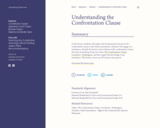
In this lesson, students will explore the fundamental reasons for the confrontation clause of the Sixth Amendment. Students will engage in a simulation, identify the history and evolution of the confrontation clause from the Annenberg Classroom video The Confrontation Clause: Crawford v. Washington, and then apply this knowledge to the simulation. This lesson covers one 50-minute class period.

In this lesson students, will examine the scope, origins and development of the Second Amendment to the United States Constitution. Students will assess and evaluate the Supreme Court’s decision in District of Columbia v. Heller (2008) by assuming the role of Supreme Court justice and engaging directly with the historical source materials used by the Court. Students will then work together as a class to decide on the scope and meaning of the Second Amendment.

In this lesson, students will examine the scope, origins and development of the Second Amendment to the United States Constitution. Students will assess and evaluate the Supreme Court’s decision in District of Columbia v. Heller (2008) by assuming the role of Supreme Court justice and engaging directly with the historical source materials used by the Court. Students will then work together as a class to decide on the scope and meaning of the Second Amendment.